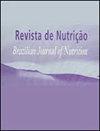Parental feeding practices and ultra-processed food consumption in preschool children
IF 0.5
4区 医学
Q4 NUTRITION & DIETETICS
Revista De Nutricao-brazilian Journal of Nutrition
Pub Date : 2022-01-01
DOI:10.1590/1678-9865202235e210269
引用次数: 2
Abstract
ABSTRACT: Objective: To investigate the association between parental feeding practices and the consumption of ultra-processed foods in preschool children. Methods: Cross-sectional study with 140 parents (father and mother) and their children (2-6 year-old). Parental feeding practices were assessed using the Comprehensive Feeding Practices Questionnaire. Children’s body weight and height were measured, and body mass index z-score per age was calculated. Parental anthropometric measurements (body weight and height) were obtained by self-report, and body mass index was calculated. The consumption of ultra-processed foods was assessed through the Child Food Frequency Questionnaire and the daily intake score was calculated. Multivariable linear regression analyses were performed to investigate the association between parental feeding practices and the consumption of ultra-processed foods. Results: Children’s ultra-processed food consumption was negatively associated with the “Monitoring” parental feeding practices. On the other hand, “Emotion Regulation” and “Health restriction” parental feeding practices were positively associated with the ultra-processed food consumption score. Conclusion: Ultra-processed food consumption was associated to the “Monitoring”, “Emotion regulation” and “Health restriction” parental feeding practices in preschool children. These results support the importance of using successful parental feeding practices to promote healthy eating in preschoolers.学龄前儿童的父母喂养方式和超加工食品消费
摘要:目的:探讨父母喂养方式与学龄前儿童超加工食品消费的关系。方法:对140名家长(父亲和母亲)及其子女(2-6岁)进行横断面研究。采用综合喂养习惯问卷对父母的喂养习惯进行评估。测量儿童体重和身高,计算各年龄段体重指数z-score。通过自我报告获得父母的人体测量数据(体重和身高),并计算体重指数。通过儿童食物频率问卷评估超加工食品的消费情况,并计算每日摄入量得分。进行了多变量线性回归分析,以调查父母喂养方式与超加工食品消费之间的关系。结果:儿童的超加工食品消费与“监测”父母喂养方式呈负相关。另一方面,“情绪调节”和“健康限制”父母喂养方式与超加工食品消费得分呈正相关。结论:超加工食品消费与学龄前儿童父母喂养行为的“监控”、“情绪调节”和“健康限制”相关。这些结果支持使用成功的父母喂养方法来促进学龄前儿童健康饮食的重要性。
本文章由计算机程序翻译,如有差异,请以英文原文为准。
求助全文
约1分钟内获得全文
求助全文
来源期刊
CiteScore
1.20
自引率
12.50%
发文量
24
审稿时长
6-12 weeks
期刊介绍:
Revista de Nutrição is former Revista de Nutrição da Puccamp, founded in 1988. It is a bimonthly publication every four months and it is of responsibility of the Centro de Ciências da Vida, da Pontifícia Universidade Católica de Campinas . It publishes articles that contribute to the study of Nutrition in its many sub-areas and interfaces; and is open to contributions of the national and international scientific communities.

 求助内容:
求助内容: 应助结果提醒方式:
应助结果提醒方式:


